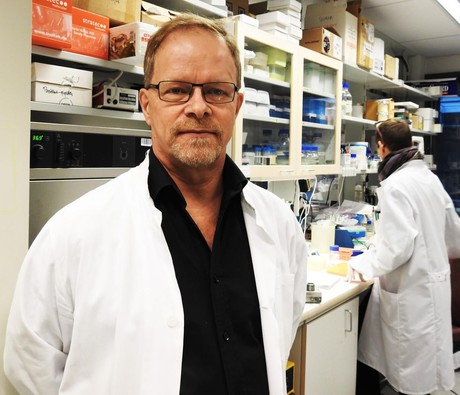Phages to fight food poisoning

It is possible that bacteriophages, bacteria-killing viruses, could be used to hunt down and kill bacteria that cause food poisoning and for food processors to routinely use phages for decontamination.
As each bacteriophage strain only infects a handful of bacterial species the ‘phage weapon’ can be honed to be very specific in the bacterial species it hunts and kills.
At the University of Helsinki, Professor Mikael Skurnik has been studying bacteriophages and phage therapy for a long time, and his work is becoming increasingly relevant as bacterial resistance to antibiotics is becoming endemic.
Skurnik is now cooperating with researchers at the Seoul National University in South Korea, in investigating the possibility of utilising phages to eradicate foodborne pathogens and so prevent food poisoning.
The researchers focused on the Yersinia enterocolitica bacterium, which is transmitted through raw or undercooked pork or, more rarely, milk and causes yersiniosis. Utensils or equipment contaminated with the bacteria can also be a source of the disease.
The disease is trans-global and symptoms include fever, abdominal pain and diarrhoea. In some cases, yersiniosis may cause arthritis as a secondary disease.
Treat the food, the utensils and the equipment
Four bacteriophages that infect the Y. enterocolitica bacterium were identified by the researchers. The most effective of this quartet was the fHe-Yen9-01 phage so it was selected for the next stage of the study where its efficacy in decontaminating food and kitchenware contaminated by bacteria was investigated.
"We focused on those foodstuffs that most often transmit infections, as well as those kitchen utensils most often used to handle these foodstuffs," said Skurnik.
Everyday products available in grocery shops, such as raw and grilled pork, as well as milk, were inoculated with Y. enterocolitica. The contaminated food was then subjected to phage treatment, after which the number of both bacteria and phages was monitored for three days.
"Phage treatment was effective in inhibiting bacterial growth in food, while the number of phages in the food grew, indicating that phages infect bacteria and grow in them also when refrigerated," said Skurnik.
Next, the researchers inoculated kitchen utensils, such as wooden and plastic cutting boards, knives and surgical gloves, with the bacteria and phages, after which the number of bacteria and phages in the utensils was monitored for two hours. In this case as well, the phages effectively inhibited bacterial growth.
Will decontamination by phage become routine?
To the best of Skurnik's knowledge, corresponding studies on the application of phages in food treatment have not been conducted previously but treatment with phages is not a novel idea. In the United States, a phage product already on the market is sprayed on raw food products to prevent Listeria bacteria growth.
"In Finland, there is no urgent need to prevent Yersinia infections, but our study can serve as a model for the prevention of other, more serious foodborne infections through phage treatment," said Skurnik.
In the future, decontamination with phages may well be part of the routine in processing food.
"One option is a phage mixture effective against several bacteria, such as the Salmonella and Campylobacter species, as well as the most common food poisoning bacteria in the gut. This mixture could also be administered in a preventive manner to farm animals, for example, mixed in their drinking water," suggested Skurnik.
Aranet supermarket temperature monitoring solution
Temperature monitoring for supermarkets is extremely important, but gathering data can be a...
Hygienic design for food production automation systems
Integrated Automation Limited (IAL) has set a new benchmark in food production by standardising...
Aussie-built AI aims to solve disconnect issues for food manufacturers
An Australian-built AI solution designed to break down communication blocks between manufacturing...














